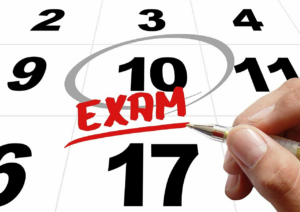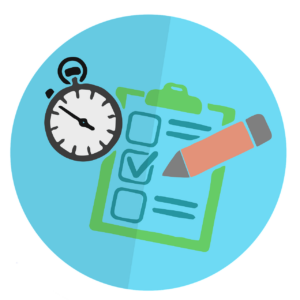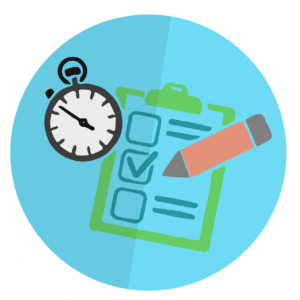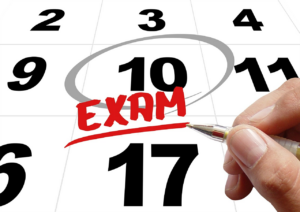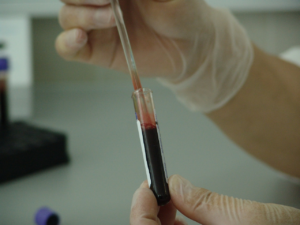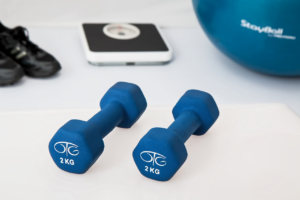Are you preparing for the NCLEX exam and wondering what score you should aim for on the practice exam? The NCLEX exam is a crucial step in becoming a licensed nurse, and a good score on the practice exam can help you gauge your readiness for the real thing.
Understanding what constitutes a good score can help you set realistic goals and focus your study efforts on areas that need improvement. Taking the NCLEX practice exam is a great way to assess your knowledge and identify areas where you may need to focus your studying.
However, it can be challenging to know what constitutes a good score. In this article, we will explore what a good score is on the NCLEX practice exam and provide tips and strategies for interpreting your results and improving your performance. Let’s dive in!
Key Takeaways
- A good score on the NCLEX practice exam can gauge readiness for the real exam and help identify areas for improvement.
- The passing threshold for the NCLEX practice exam is typically 60-65%, with a score of 75% or higher generally considered good.
- Effective time management, reflection on performance, and dedication are crucial for success in NCLEX preparation.
- Seeking support from trusted resources such as peers, mentors, and review courses can be helpful in preparing for the NCLEX.
Understanding the NCLEX Exam
Are you ready to understand the ins and outs of the NCLEX exam, so you can confidently approach your practice tests and ultimately score your best?
The NCLEX exam format is unique, and it’s important to understand what you’re up against before you start taking practice tests. The exam is computerized, and the questions are adaptive – meaning that the computer adjusts the difficulty of the questions based on your performance. This means that if you’re doing well, the questions will get harder, and if you’re struggling, the questions will become easier.
To approach the NCLEX exam with confidence, it’s important to develop effective test-taking strategies. Practice tests are a great way to do this, as they allow you to get a feel for the format of the exam and the types of questions you’ll be asked.
One important strategy is to manage your time effectively. The NCLEX exam is timed, and you’ll have a set amount of time to complete each section. Make sure you’re aware of how much time you have, and pace yourself accordingly.
Additionally, it’s important to read each question carefully and thoroughly, and to eliminate answers that you know are incorrect before making your final selection.
By understanding the format of the NCLEX exam and developing effective test-taking strategies, you’ll be well on your way to achieving a good score on your practice tests.
Taking the NCLEX Practice Exam
You’re about to embark on a journey of self-discovery as you take on the NCLEX practice test. This test is designed to help you assess your knowledge and skills in nursing.
To make the most of this practice test, here are some useful strategies and preparation techniques you can follow:
- Create a study plan: Break down the topics into smaller parts and allocate specific time to study each section.
- Time yourself: Mimic the actual test-taking environment by timing yourself as you answer the questions. This will help you manage your time better during the actual exam.
- Focus on your weak areas: Identify your weak areas and focus on them during your preparation.
- Review rationales: Don’t just look at the correct answer, but also review the rationales for the incorrect answers to understand the concepts better.
- Practice, practice, practice: The more you practice, the more confident you’ll feel during the actual exam.
With these strategies and preparation techniques, you’ll be better equipped to tackle the NCLEX practice test and identify areas where you need improvement.
Remember, this is just a practice test, so don’t get too discouraged if you don’t get a perfect score. Use this as an opportunity to learn and improve.
What Is Considered a Good Score?
As you finish the NCLEX practice test, it’s natural to wonder how well you did and what it means for your future as a nurse. The NCLEX score interpretation can be a bit tricky, but it’s important to understand what is considered a good score.
The passing threshold for the NCLEX exam is set by the National Council of State Boards of Nursing (NCSBN) and varies depending on the state you are in. However, the passing threshold for the NCLEX practice exam is typically set at around 60-65%.
While a score above the passing threshold is obviously desirable, a good score on the NCLEX practice exam is one that indicates you are well-prepared for the actual exam. A score of 75% or higher is generally considered a good score, as it indicates that you have a solid understanding of the material and are likely to pass the actual exam.
However, it’s important to remember that the NCLEX practice exam is just that – a practice exam. It’s designed to help you identify areas where you need to improve and to give you a sense of what the actual exam will be like. So, while a good score is certainly something to strive for, it’s not the only factor that will determine your success on the NCLEX exam.
How to Interpret Your Practice Exam Results
Once you receive your results, take a moment to visualize yourself reviewing the areas where you excelled and those that require more attention.
Analyzing trends is an essential step to interpreting your practice exam results. Look for patterns and consistency in the types of questions you answered correctly or incorrectly. Did you struggle with pharmacology questions? Did you excel in mental health concepts?
Identifying weaknesses is equally important. Knowing where you need to improve can help you create a targeted study plan to increase your chances of success on the actual NCLEX exam.
It’s important to keep in mind that a practice exam is just that – a practice. It’s an opportunity for you to assess your current knowledge and skills and identify areas for improvement. Don’t be discouraged if your score isn’t as high as you’d like it to be. Instead, use your results as a guide for your future study efforts. With dedication and hard work, you can continue to improve and ultimately achieve success on the NCLEX exam.
Strategies for Improving Your Score
If you want to improve your NCLEX practice exam scores, there are a few strategies you can use. Start by reviewing your study habits and finding ways to improve them. This might include using additional resources like flashcards or study guides, or finding a study group to join.
Additionally, time management techniques can help you make the most of your study time and stay focused throughout the exam.
Study Tips and Resources
You’ll want to check out some study tips and resources to help you prepare for the NCLEX practice exam and improve your score! Here are some suggestions to get you started:
- Use NCLEX practice question banks to familiarize yourself with the format and content of the exam.
- Join a study group or find a study buddy to keep you accountable and motivated.
- Create a study schedule and stick to it, breaking down the material into manageable chunks.
- Use flashcards or other memory aids to help you remember important concepts and terms.
- Consider enrolling in a review course or hiring a tutor for personalized support.
By combining these study strategies with practice resources, you can feel confident in your ability to perform well on the NCLEX practice exam.
Remember to focus on areas where you may need improvement, but also give yourself credit for your strengths. With dedication and persistence, you can achieve a good score and take the first step towards a successful nursing career.
Time Management Techniques
Effective time management is crucial for success on the NCLEX, and utilizing proven techniques can help boost productivity and reduce stress. One popular time management technique is the Pomodoro technique. It involves breaking down work into 25-minute intervals and taking short breaks in between. This technique not only helps you stay focused and productive, but it also gives your brain the necessary breaks it needs to avoid burnout and fatigue.
Another important aspect of time management is prioritization skills. It’s essential to prioritize your tasks and focus on the ones that are most important or urgent. By doing this, you can ensure that you are using your time wisely and not wasting it on less critical tasks.
Additionally, prioritization skills can help you avoid feeling overwhelmed or stressed by breaking down larger tasks into smaller, more manageable ones. Overall, mastering time management techniques like the Pomodoro technique and prioritization skills can help you stay focused, motivated, and productive while preparing for the NCLEX.
Final Thoughts and Next Steps
Now that you’ve completed the NCLEX practice exam, take some time to reflect on your performance and identify areas for improvement before taking the actual exam.
One important step is to analyze your score and see how you did in each section. This will help you determine which areas you need to focus on and develop a study plan that targets your weaknesses. Keep in mind that a good score on the practice exam doesn’t necessarily guarantee success on the actual exam, but it can be a good indicator of your preparedness.
After analyzing your score, it’s time to take future steps in your NCLEX preparation. Consider reviewing specific content areas that you struggled with, practicing time management techniques, and taking more practice exams to build your confidence and skill level.
Additionally, seek support from trusted resources such as peers, mentors, and review courses. Remember that taking the NCLEX can be a stressful and daunting experience, but with the right preparation and mindset, you can succeed. Keep pushing forward and stay focused on your goals.
Frequently Asked Questions
How often can you take the NCLEX practice exam?
You can take the NCLEX practice exam as often as you need to feel prepared for the real exam. The frequency of taking the practice exam will depend on your level of preparation and confidence. Some people may take it multiple times a week, while others may only take it once or twice before feeling confident in their abilities.
It’s important to use the practice exam as a tool to identify areas where you need to improve and to become familiar with the format of the real exam. Don’t be discouraged if you don’t score well on your first attempt, use it as an opportunity to learn and improve.
Are there any penalties for guessing on the NCLEX practice exam?
When taking the NCLEX practice exam, there aren’t any guessing penalties. However, it’s important to use strategic approaches when answering questions.
This means carefully reading each question and eliminating obviously incorrect answers before making an educated guess. By using this approach, you can increase your chances of selecting the correct answer and avoid unnecessary guessing penalties.
How long does it take to receive your NCLEX practice exam results?
After taking the NCLEX practice exam, you may be wondering how long it will take to receive your results. The turnaround time for receiving NCLEX practice exam results can vary, but typically it takes around 24-48 hours.
Once you receive your results, it’s important to perform a score analysis and evaluate your performance. This will help you identify areas where you may need to improve and focus your study efforts. By regularly taking practice exams and analyzing your results, you can benchmark your performance and work towards achieving a good score on the actual NCLEX exam.
Can taking the NCLEX practice exam guarantee a passing score on the actual NCLEX exam?
While taking the NCLEX practice exam can help you gauge your NCLEX preparation and exam readiness, it does not guarantee a passing score on the actual NCLEX exam. The practice exam is designed to simulate the actual exam and give you an idea of the types of questions you will encounter.
However, the actual exam will have unique questions and scenarios that may not be covered in the practice exam. It is important to use the practice exam as a tool to identify areas where you may need further study and to gain confidence in your test-taking skills.
Ultimately, your performance on the actual NCLEX exam will depend on a variety of factors, including your knowledge, critical thinking skills, and test-taking strategies.
Are there any accommodations available for individuals with disabilities taking the NCLEX practice exam?
If you have a disability and need accommodations to take the NCLEX practice exam, there are options available to you. The National Council of State Boards of Nursing (NCSBN) provides accommodations for individuals with disabilities, such as extended testing time, a separate testing room, or assistive technology.
To request accommodations, you must submit documentation of your disability and a request form to the NCSBN. It’s important to note that accommodations for the practice exam may not necessarily be the same as those provided for the actual NCLEX exam.
If you have any questions or concerns about accommodations, reach out to the NCSBN for more information.
Conclusion
Congratulations on completing the NCLEX practice exam! By taking this important step, you’re well on your way to becoming a successful nurse.
Now that you have your practice exam results, you may be wondering what score is considered good. The answer is that it depends on your individual goals and the requirements of the nursing program or state board you’re applying to.
Regardless of your score, it’s important to remember that the practice exam is just that – a practice. Use this opportunity to identify areas where you need improvement and develop strategies to strengthen your knowledge and test-taking skills.
With dedication and hard work, you can achieve your desired score on the actual NCLEX exam and begin your journey as a confident and competent nurse.


















